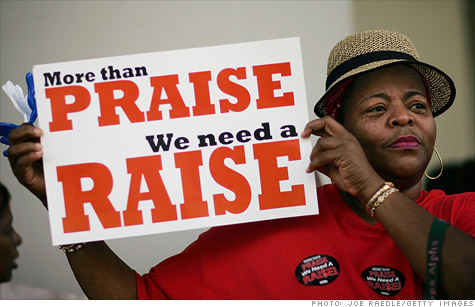The reality is that toward the middle of his career at Bain, Romney made a fateful strategic decision: He moved away from creating companies like Staples through venture capital schemes, and toward a business model that involved borrowing huge sums of money to take over existing firms, then extracting value from them by force. He decided, as he later put it, that "there's a lot greater risk in a startup than there is in acquiring an existing company." In the Eighties, when Romney made this move, this form of financial piracy became known as a leveraged buyout, and it achieved iconic status thanks to Gordon Gekko in Wall Street. Gekko's business strategy was essentially identical to the Romney–Bain model, only Gekko called himself a "liberator" of companies instead of a "helper."
Here's how Romney would go about "liberating" a company: A private equity firm like Bain typically seeks out floundering businesses with good cash flows. It then puts down a relatively small amount of its own money and runs to a big bank like Goldman Sachs or Citigroup for the rest of the financing. (Most leveraged buyouts are financed with 60 to 90 percent borrowed cash.) The takeover firm then uses that borrowed money to buy a controlling stake in the target company, either with or without its consent. When an LBO is done without the consent of the target, it's called a hostile takeover; such thrilling acts of corporate piracy were made legend in the Eighties, most notably the 1988 attack by notorious corporate raiders Kohlberg Kravis Roberts against RJR Nabisco, a deal memorialized in the book Barbarians at the Gate.
Romney and Bain avoided the hostile approach, preferring to secure the cooperation of their takeover targets by buying off a company's management with lucrative bonuses. Once management is on board, the rest is just math. So if the target company is worth $500 million, Bain might put down $20 million of its own cash, then borrow $350 million from an investment bank to take over a controlling stake.
But here's the catch. When Bain borrows all of that money from the bank, it's the target company that ends up on the hook for all of the debt.
Now your troubled firm – let's say you make tricycles in Alabama – has been taken over by a bunch of slick Wall Street dudes who kicked in as little as five percent as a down payment. So in addition to whatever problems you had before, Tricycle Inc. now owes Goldman or Citigroup $350 million. With all that new debt service to pay, the company's bottom line is suddenly untenable: You almost have to start firing people immediately just to get your costs down to a manageable level.
"That interest," says Lynn Turner, former chief accountant of the Securities and Exchange Commission, "just sucks the profit out of the company."
Continue reading here.





















